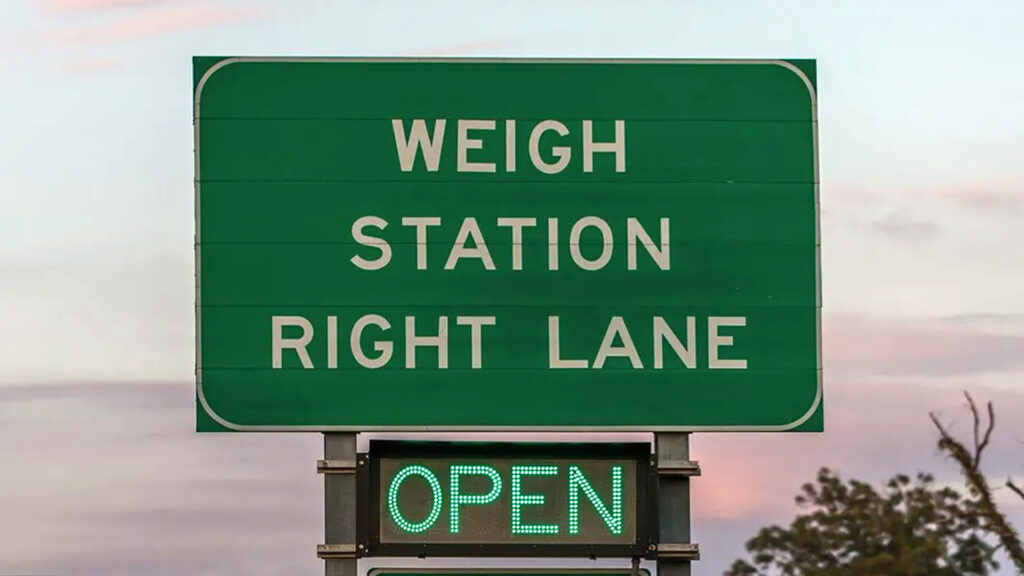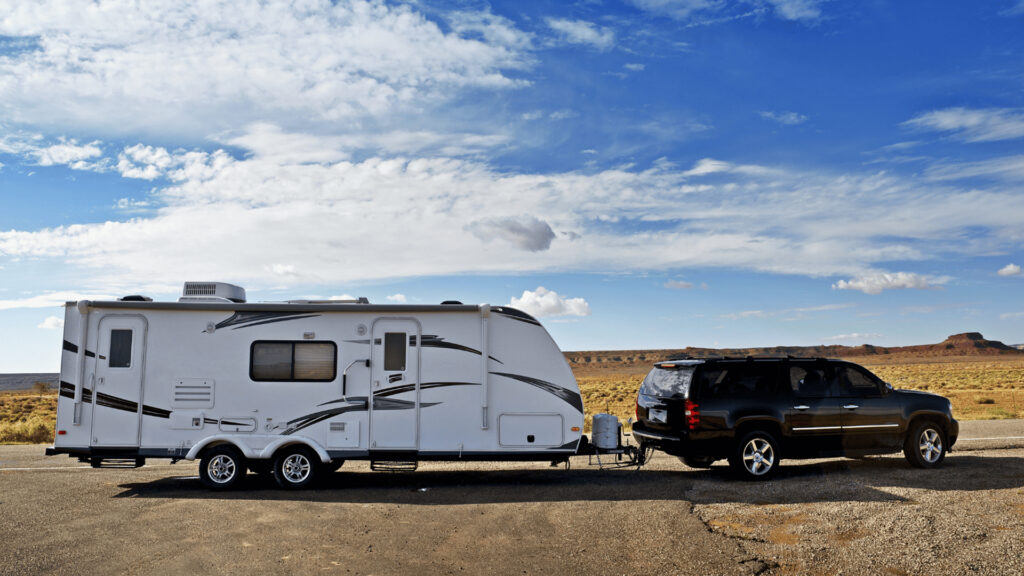Table of contents
As RV owners set off on their road trips, one question that often comes up is, “Do RVs have to stop at weigh stations?” or even “Do motorhomes have to stop at weigh stations?” The answer to these questions isn’t as straightforward as one might think. It depends on several factors, including the RV’s weight, the purpose for which it is being used, and the state you’re traveling through. Understanding whether you need to stop at weigh stations — and what states require RVs to stop at weigh stations — is crucial, not only for ensuring compliance with the law but also to avoid fines or delays during your trip. In this comprehensive guide, we’ll cover everything you need to know about RV weigh station requirements. We’ll discuss RV weight classifications, the purpose of weigh stations, general rules, and state-specific requirements. We’ll also explore the consequences of ignoring these requirements, ensuring that you’re prepared for a safe and smooth journey.
Understanding RV Weight Classifications
To fully understand whether an RV/motorhomes needs to stop at a weigh station, it’s important to first understand RV weight classifications. Weights are generally classified using two key metrics: Gross Vehicle Weight Rating (GVWR) and Gross Combined Weight Rating (GCWR).
- GVWR is the maximum weight an RV can safely handle, including the weight of the RV itself, passengers, cargo, and fluids like water or fuel.
- GCWR is the maximum combined weight of the RV and any towed vehicles or trailers.
The weight of an RV is a key factor in determining whether it needs to stop at weigh stations. For example, many states use a 10,000-pound threshold to determine whether a vehicle should stop at weigh stations. This threshold is important because it generally applies to the weight of the vehicle alone.
RV classes (Class A, B, and C) vary in weight:
- Class A motorhomes are typically the heaviest, often exceeding 20,000 pounds.
- Class B campervans are smaller, often weighing around 6,000 to 8,000 pounds.
- Class C motorhomes usually weigh between 10,000 and 20,000 pounds.
This is in stark contrast to a typical passenger car, which weighs around 4,000 pounds or a light-duty truck, which typically weighs around 8,000 pounds. The heavier the RV, the more likely it is that it will be required to stop at weigh stations.
The Purpose of Weigh Stations
Weigh stations primarily exist to ensure that commercial vehicles adhere to weight restrictions that prevent excessive wear on road infrastructure, as well as to ensure safety and regulatory compliance. They serve several purposes:
- Safety Checks: Weigh stations monitor the weight of vehicles to prevent unsafe loads on the roads. Overloaded vehicles can cause serious damage to roads and pose safety hazards.
- Emissions Testing: Many weigh stations check for emissions compliance, ensuring that vehicles are not contributing excessively to air pollution.
- Driver Log Certification: Commercial drivers are required to maintain logs that record their driving hours to ensure they don’t exceed driving limits, improving safety for everyone on the road.
- Weight Verification: Weigh stations help enforce weight restrictions, which prevent vehicles from exceeding limits that could damage roads or cause accidents.
While weigh stations were originally designed for commercial vehicles, they are still used to monitor all types of vehicles, including RVs, in some states.
General Rules for RVs at Weigh Stations

In general, most private, non-commercial RVs do not need to stop at weigh stations. However, there are important exceptions. The key factors that determine whether your RV needs to stop are:
- Weight Thresholds: If the RV exceeds certain weight limits, it will likely need to stop at weigh stations. For instance, vehicles over 10,000 pounds are often required to stop, especially in certain states.
- Commercial Use: If the RV is being used for commercial purposes (e.g., transporting goods for hire or rented out for commercial use), it may need to stop at weigh stations, even if it’s under the 10,000-pound threshold.
For most personal RV owners traveling for leisure, weigh stations are typically not a requirement. However, the rules can vary significantly by state, and there are exceptions that will be covered in the next section.
State-by-State Weigh Station Requirements for RVs
The requirements for stopping at weigh stations can differ depending on the state you’re in. If you’re wondering what states require RVs to stop at weigh stations, here’s a breakdown of the requirements in different states:
- States Requiring Stops for Vehicles Over 10,000 Pounds: In these states, any vehicle weighing more than 10,000 pounds is required to stop at weigh stations. These states include:
- Arkansas
- Georgia
- Iowa
- Louisiana
- Massachusetts
- Michigan
- Minnesota
- Nevada
- North Dakota
- Ohio
- Rhode Island
- Washington
- Wisconsin
- States Requiring Stops for Vehicles Over 26,000 Pounds: These states require vehicles weighing more than 26,000 pounds to stop at weigh stations:
- Colorado
- New Mexico
- Oregon
- Pennsylvania
- States Where Weigh Station Stops Are Discretionary: In some states, law enforcement has the discretion to pull RVs into weigh stations, regardless of their weight. These states include:
- Alaska
- Iowa
- Illinois
- Kansas
- New Hampshire
- North Carolina
- Oklahoma
- Utah
- Vermont
- West Virginia
- Maine
- Mississippi
- Texas
Given the variations in rules across states, RV owners should always verify local laws before their trip to avoid any surprises.
How to Determine Your RV’s Weight

To comply with weigh station requirements, it’s important to know your RV’s weight. Manufacturer’s dry weight often doesn’t provide an accurate picture of the total weight, as it excludes passengers, cargo, and fluids.
The most reliable method for determining your RV’s weight is by using truck stop scales like CAT Scale. These scales are available at most truck stops and can weigh your RV for a small fee. Weighing your RV helps ensure that you stay within legal weight limits and avoid potential fines.
Many RV owners also use mobile apps to locate nearby weighing facilities, making it easier to check your weight before hitting the road.
Managing Your RV’s Weight Effectively
To avoid the need to stop at weigh stations unnecessarily, consider keeping your RV’s weight under control. Here are a few tips for effective weight management:
- Minimize excess cargo: Only bring what you need on your trip. Avoid overloading your RV with unnecessary items.
- Reduce water and fluid weight: Don’t carry more water or fluids than you need.
- Use lighter equipment: Consider lighter options for common equipment, such as solar panels instead of a generator.
- Mind your passengers: The weight of passengers adds up. Be mindful of how many people you bring along.
Proper weight distribution is also important for safe driving and handling. Make sure the weight is evenly distributed throughout the RV to avoid handling issues or damage to tires and suspension.
Consequences of Ignoring Weigh Station Requirements
Ignoring weigh station requirements or operating an overweight RV can lead to several consequences:
- Fines and Penalties: States impose fines for not stopping at weigh stations or for exceeding weight limits. The fines can vary widely depending on the state and violation.
- Safety Risks: Overloaded RVs can be more prone to tire blowouts, engine strain, and accidents due to increased stopping distance.
- Insurance Implications: If you’re involved in an accident and your RV is overweight, your insurance provider might deny your claim.
By stopping at weigh stations when required and adhering to weight limits, you ensure the safety of yourself and others on the road.
Understanding the rules regarding weigh stations for RVs can be complex, especially when wondering, do motorhomes have to stop at weigh stations? It’s crucial for your safety and legal compliance to know the answer. Always verify the specific requirements in the states you’ll be traveling through, and make sure to check your RV’s weight before heading out. By doing so, you’ll ensure a smoother, safer journey and avoid the risk of fines or penalties.
Plan a Smooth Journey — Stay Comfortable at Black Hawk Creek RV Park
Long-distance travels are easier when you have the perfect place to rest and recharge. After navigating RV weight regulations and long stretches on the road, reward yourself with a relaxing stay at Black Hawk Creek RV Park. Located in the heart of South Dakota’s stunning natural beauty and rich cultural sites, our easy-access sites are perfect for a stress-free stopover. Whether you’re looking to unwind or explore nearby attractions, Black Hawk Creek is your gateway to an extraordinary adventure. Book your stay today and make every mile of your journey unforgettable!

